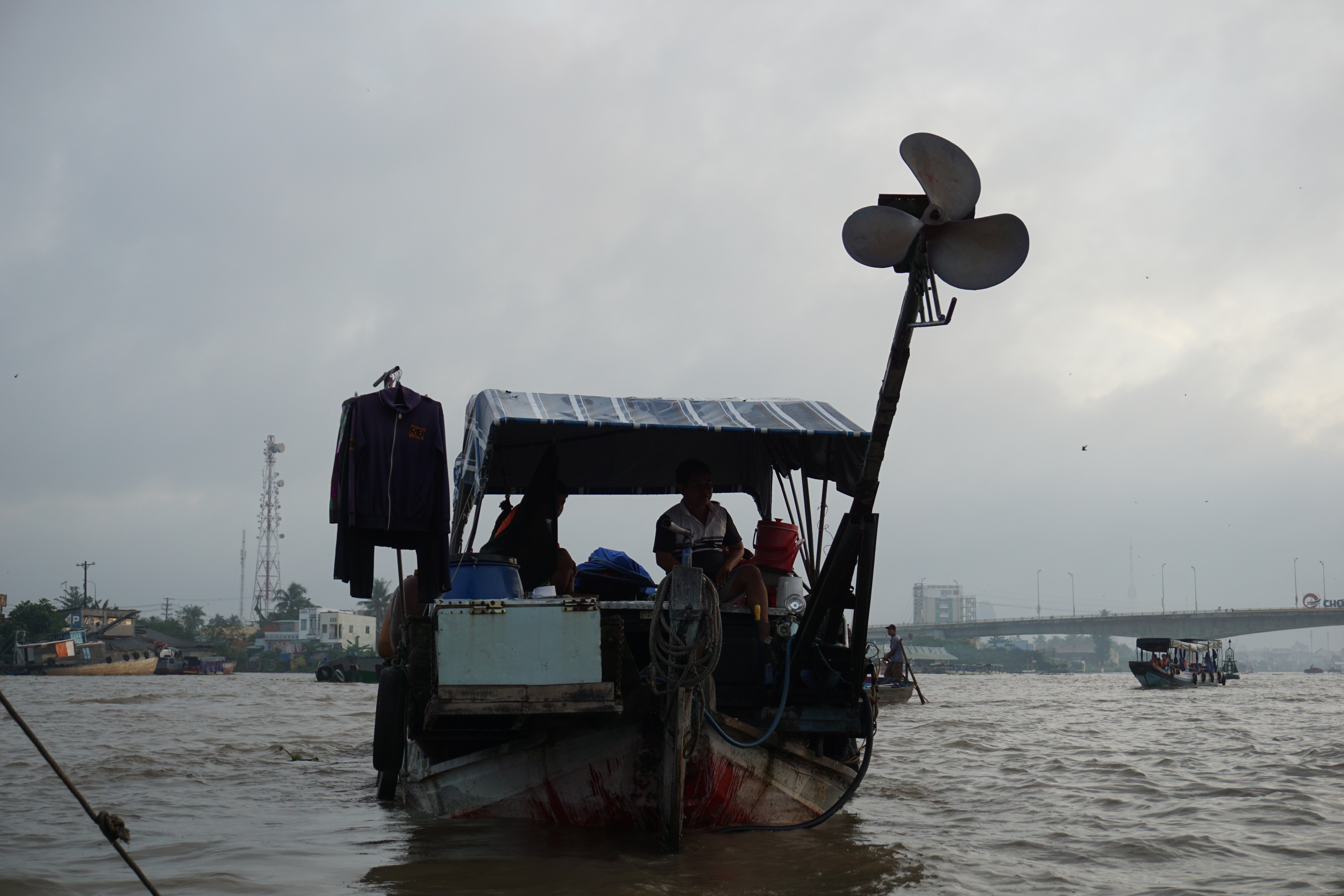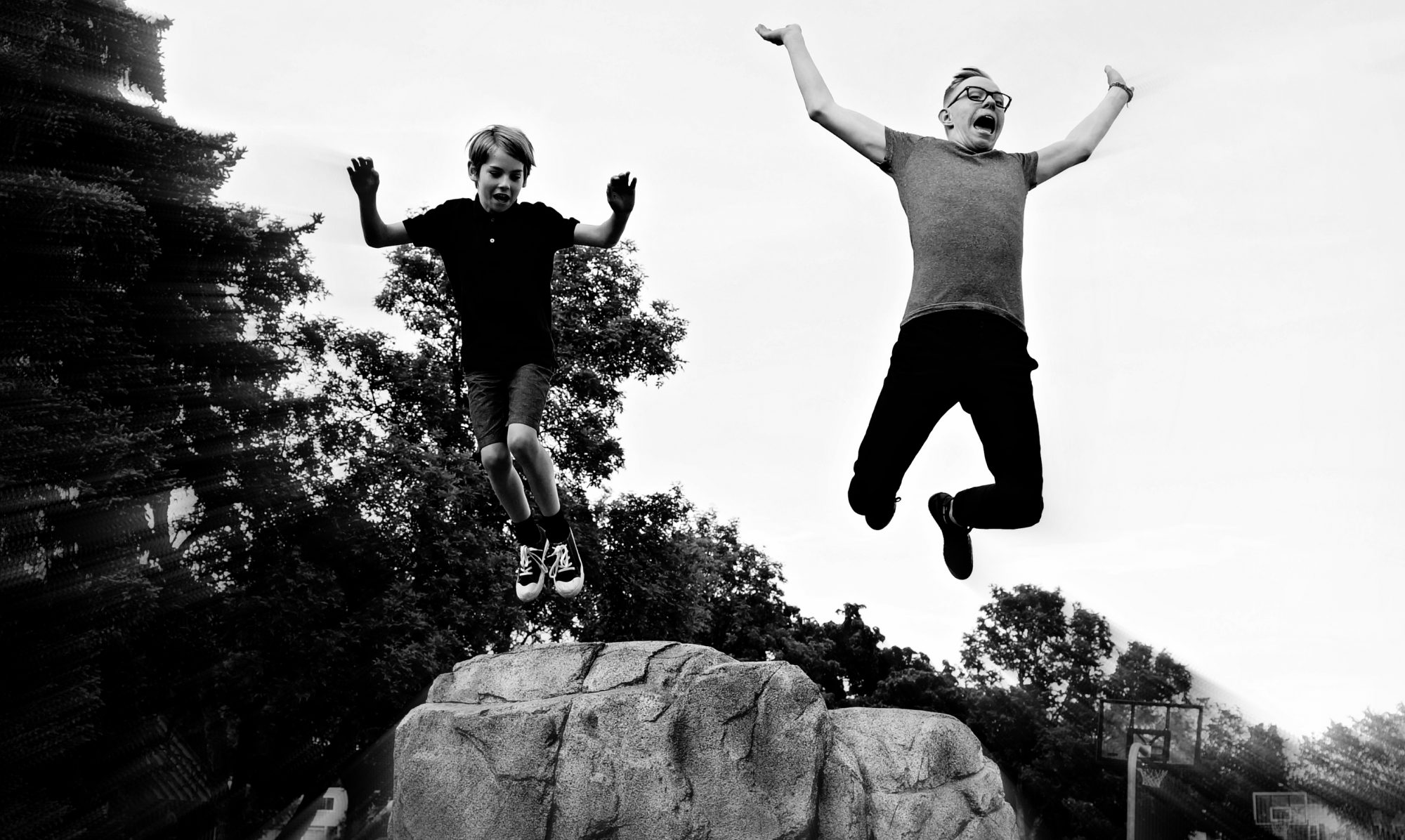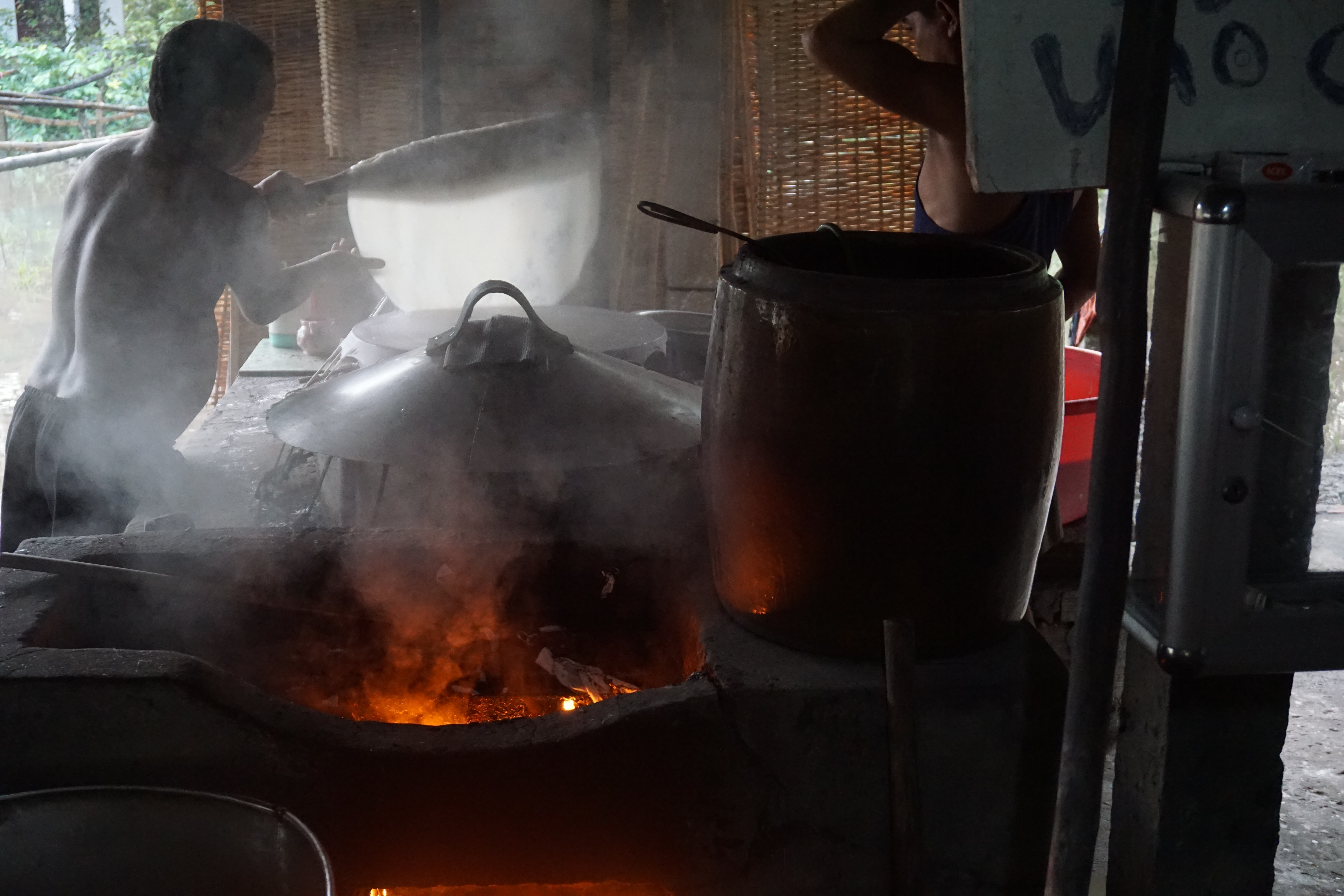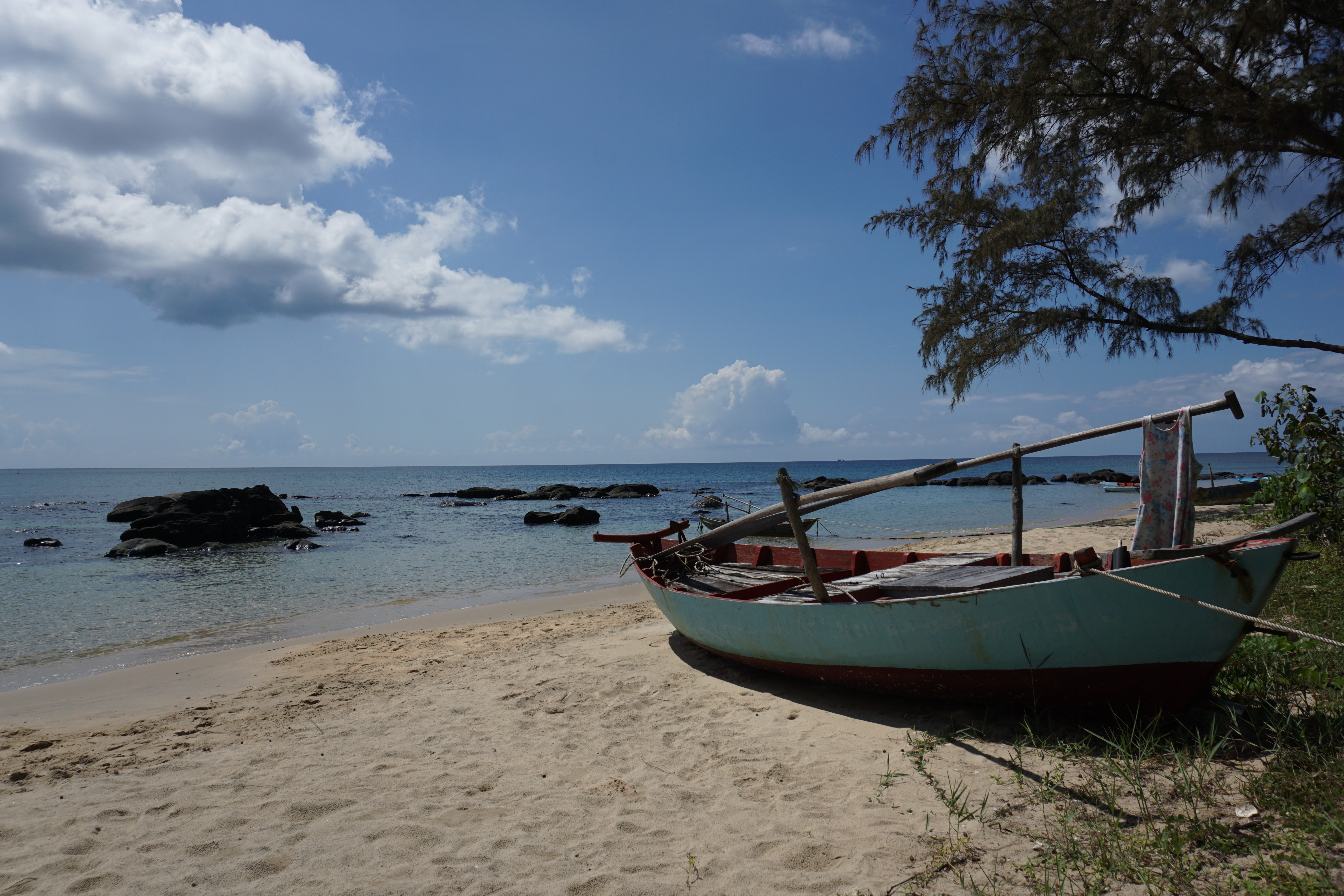We are parents and educators. Responsibility is our middle names and so naturally, in the course of this journey, we did a little research into the topic of responsible and ethical travel. A quick search brings up numerous articles and manifestos with pretty consistent messaging (one of the more comprehensive examples can be found at https://epicureandculture.com/ethical-travel/ ) Much of the advice seems to be common sense. Yet moving from Japan to Russia to Vietnam to Indonesia we find ourselves from time to time in uncomfortable situations wondering, silently and aloud, if the path of responsible and ethical wandering is as straight or simple as sold.
It was in Can Tho, Vietnam we decided to take a tour through the Mekong. We looked around, chose a small boat and local guide recommended through the family run hotel we were staying at. We passed on the option to have lunch in a “traditional village” or to partake in any activities involving photos with endangered species. According to our research we were being “good tourists”.
Our tour of the Mekong started at 5:00 am. We walked through the dark streets carrying our sunrise breakfast wrapped in cellophane packages and plastic bags. Our tour included visits to two water markets and a rice noodle factory. Our guide was Xan, a law students from the nearby university who was preparing for an articling position. We traveled an hour up the river with the rising sun, getting glimpses at the “back porches” and homes of those living and working  along the river’s bank, stopping occasionally to cut plastic bags or fishing line from the boat’s propeller. We watched the exchange of goods at the large wholesale water market and sampled seasonal fruit before being taken to see two noodle “factories”.
along the river’s bank, stopping occasionally to cut plastic bags or fishing line from the boat’s propeller. We watched the exchange of goods at the large wholesale water market and sampled seasonal fruit before being taken to see two noodle “factories”.
The first noodle joint was a family operated affair where a father and son were mixing, stirring, cooking and setting rice pancakes out to dry. We were able to see the ingredients, ask some questions and learn about the preparation process.In this building of corrugated metal the family burned rice husks and free “cotton scraps”acquired from nearby clothing manufacturing. The free fuel, much of it synthetic, is the byproduct of a textile industry that has moved from China to Vietnam in search of cheaper labour. The fuel reduces output costs and saves landfill space but creates a toxic smoke that impacts the health of the family. A new locally made “Northface ” knock off hangs from our shoulders.
We then walked to a second site, a large, airy compound designed specifically to allow tourist an interactive authentic experience.Here all the noodles were made by smiling women and only rice husks were burned. Xan noted, “tourists don’t like the black smoke of free fuel.”
Later as we visited a second, smaller floating market, Xan shared that the government gives incentives, such as free electricity, to floating market sellers as the markets are such an important tourist attraction and source of local revenue. On the day we visited, the number of tourist boats experiencing the market equaled those of merchants and buyers and this was in the off season. What would be the gain and/or the loss to the merchants and customers, communities and/or environment if the river markets evolved without government subsidies? Is tourism preserving or stagnating communities? Do the markets represent an authentic or contrived experience?
From the Mekong Delta we traveled by every mode of local transport possible to reach the quiet beaches of Phu Quoc. This was our first “resort” experience. The White Lotus, like many others in the area, is a recently built family affair, consisting of a dozen small bungalows separated by hibiscus, palms, jasmine and banana trees. With a restaurant, pool, a few residential pets, a generous breakfast and kind staff, it was my kids vision of heaven. It is a business trying very hard to set itself apart from similar places popping up in the area, largely through high ratings on internet booking sites. Any hostel/guesthouse/hotel/restaurant with a decent travel rating is sure to advertise the fact. And managers at such places constantly tweek service in response to customer feedback, “The too Asian breakfast” leads to the availability of pancakes every morning and a general blanding of flavour , “hot water issues” are solved with a generator that loudly kicks on when the island’s power crashes, and the “staff can’t speak English” might mean changing hiring practices. In Phuc Quoc we needed to ask for chopsticks and spoons and chilies as forks and knives and ketchup just don’t work so well for the ubiquitous fried rice. What is fair for a tourist to expect from a hotel or a restaurant? When does the expectation of service cross into entitlement? What impact does the world of reviews have on tourism, service, communities, and environment?
In booking accommodations for our return to Saigon we looked for something more residential, outside the center of the back packers/ tourist attraction site zone and the weirdness travelers create when food, drink and spa treatments are a ¼ of the price “back home”. Our thinking was an apartment would allow us to buy groceries at the market, cook a little, and explore some more everyday sights.
That is how we found ourselves in a gated community of brand new high rises with all the amenities of an upscale development- pools, parks, cafes, convenience stores and gyms in every building, vast green gardens, an army of cleaners, branded taxis waiting and security on every curb, a private school and international hospital. Heck, cars even stopped for pedestrians here. It felt a little like the set of “The Giver” or “Hunger Games”. From the 33rd floor, we looked down and over the city. It is easy to see the next cluster of streets in line to be razed by the bulldozer. Actually walk out the gate and you realized, the exterior walls of this planned community are lined with the temporary corrugated tin structures of construction labour, the curbs littered with refuse and the convenient multi lane freeway difficult to cross. This was also one of the easiest places to meet locals in a non commercial exchange setting. Was this a local,typical and/or authentic experience? Was this a glimpse into the new Vietnam, a westernized Vietnam, both or neither?
Now we are in Bali for a month. A beautiful, lush Indonesian island that sees 5 million tourists a year. Mount Agung is spewing ash and 100,000 Balinese are in need of evacuation, facing the possible loss of homes, incomes, communities and religious sites. Yet it is the tragedy of cancelled holiday flights and lost revenue that occupies the media coverage here and abroad. Should things become more serious, what role/steps if any could or should we take in response? In an emergency, how might the presence of mass numbers of foreigners impact response and resource allocation?
This journey, like parenthood, didn’t come with directions, just a lot of advice and well wishes. We are figuring it out as we go along. We don’t always know what to do or always feel comfortable with the choices we make on the road. We don’t always understand at the time (if ever) the implications of our choices and on what and whom. We recognize it is privilege that has made travel possible and whether we like to admit it or not, as travelers we feel entitled to certain standards or opportunities or experiences. While top 10 lists with easy to check boxes might bring us some comfort we will need to dig a little bit deeper than google to work through how to be responsible and ethical travelers.


